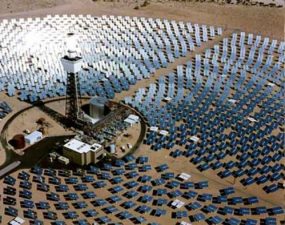![meter(1)[1]](https://www.greenprophet.com/wp-content/uploads/2009/07/meter11.jpg) The Israeli Electric Corporation, otherwise known as Hevrat HaHashmal, has agreed to participate in what are known as feed-in tariffs for electricity supplied by independent private suppliers.
The Israeli Electric Corporation, otherwise known as Hevrat HaHashmal, has agreed to participate in what are known as feed-in tariffs for electricity supplied by independent private suppliers.
It’s part of Israel’s bid to reduce its greenhouse gas emissions by 20% by 2020.
Feed-in tariffs apply to electricity that is supplied by renewable or “clean” sources such as geo-thermal power, solar and wind energy, and biomass energy (bio fuels, etc.).
Offering attractive prices, entrepreneurs like Sunday Solar, and investors, are looking at it as an opportunity to take advantage of the guaranteed buy back rate. It means that consumers in Israel will be able to generate their own electricity using solar power and wind turbines and sell the surplus back to the national grid.
The back end story: The Israel Public Utility Authority approved the feed-in tariff policy in June, 2008, for small domestic and commercial plants; by agreeing to purchase the electricity as follows:
- The plan is limited to a total “feed in” output of 50 MW over a seven year period (rates vary if providing wind power).
- The Israel Electric Company is obligated to purchase all photovoltaic (PV) produced electricity at the feed-in tariff rate for a 20 year period.
- A maximum amount of 15 kWp of electricity is to be allocated for the domestic sector, with 50 kWp designated for the business sector.
- The electricity systems must be installed on an already built structure.
- The proposed feed-in tariff rate is to be NS 2.01 per kwh for electricity produced by PV systems. This is a higher rate that that from normally produced electricity which runs to NS 0.50, subject to price adjustment.
While the higher renewable price is higher than that for electricity produced by coal, fuel oil or natural gas, it is more friendly to the environment and gives an incentive for the installation of residential renewable energy systems and ones installed to provide power for communities, such as the recent solar power plant installed in the town of Katzrin by a joint Israel-Chinese venture Solarit Doral and Sun Tech Power Holdings.
The Katzrin solar power plant is expected to generate around 85,000 kWh of electricity when running at full capacity. Installing these plants in a community helps create an added stimulus to “go green”, while creating “green jobs” and meeting new international standards for renewable energy.
Israel’s terrain for installing residential renewable energy systems is similar to American states such as Arizona, California, Texas, and many others with ample sunshine and soaring electricity prices during the summer months.
Due to the importance being placed on the use of renewable energy systems, the feed-in tariff system has been enacted in other countries such as Australia, Austria, Brazil, and Canada as well as some states in the US.



One thought on “Israelis and Investors to Benefit from Feed-in Electricity Tariffs”
Comments are closed.